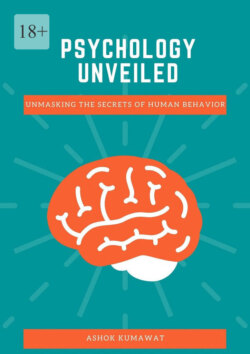Читать книгу Psychology Unveiled: Unmasking the Secrets of Human Behavior - Ashok Kumawat - Страница 9
На сайте Литреса книга снята с продажи.
Chapter 7: Learning and Memory: From Information Acquisition to Recall
ОглавлениеIntroduction:
Learning and memory are fundamental processes that underpin our ability to acquire, store, and retrieve information. This chapter delves into the intricacies of learning and memory, exploring the stages involved, the factors that influence them, and the mechanisms through which we encode, retain, and recall information. By unraveling the secrets of learning and memory, we gain valuable insights into the complexities of human behavior and the fascinating workings of the mind.
Learning: The Acquisition of Knowledge:
Learning is the process by which we acquire new knowledge, skills, behaviors, or attitudes through experiences, observation, or instruction. It involves the transformation of information into a meaningful form that can be stored and retrieved later. Learning can occur through various mechanisms, including classical conditioning, operant conditioning, and observational learning.
Classical conditioning, as demonstrated by Pavlov’s experiments, involves the association of a neutral stimulus with a reflexive response. Over time, the neutral stimulus becomes a conditioned stimulus that elicits a conditioned response. Operant conditioning, on the other hand, relies on the consequences of behavior to shape future actions. Rewards and punishments influence the likelihood of behavior recurrence.
Observational learning, as proposed by Bandura, occurs through the observation and imitation of others. We learn by watching and modeling the behaviors, attitudes, and values exhibited by individuals in our social environment.
Memory: The Storage and Retrieval of Information:
Memory is the process through which we encode, store, and retrieve information. It involves the formation of mental representations or memory traces that allow us to retain and access knowledge and experiences. Memory can be classified into different types, including sensory memory, short-term memory, and long-term memory.
Sensory memory holds brief and transient impressions of sensory stimuli. It acts as a buffer, allowing us to retain a limited amount of information for a short duration. Short-term memory, also known as working memory, holds information temporarily and allows for active manipulation and processing of that information.
Long-term memory is the vast repository of knowledge and experiences accumulated over a lifetime. It can be further divided into explicit (declarative) and implicit (non-declarative) memory. Explicit memory refers to conscious recollection of facts, events, and experiences, while implicit memory refers to the influence of past experiences on current behavior without conscious awareness.
Encoding, Consolidation, and Retrieval:
The process of memory involves three interrelated stages: encoding, consolidation, and retrieval. Encoding is the initial acquisition and transformation of information into a form that can be stored in memory. It occurs through attention, perception, and active processing of the information’s meaning and relevance.
Consolidation is the process by which memories are stabilized and strengthened over time. It involves the reorganization and integration of new information with existing knowledge. Sleep, rehearsal, and emotional arousal can enhance consolidation processes.
Retrieval refers to the recovery and access of stored information when needed. It can be influenced by various factors, such as the cues present during encoding and the context in which the information was initially learned. Retrieval cues, context-dependent cues, and priming can facilitate the retrieval process.
Forgetting and Memory Errors:
Forgetting is a natural aspect of memory and occurs when stored information becomes inaccessible or is no longer needed. Factors such as interference, decay, and retrieval failures can contribute to forgetting. Interference occurs when new or old information disrupts the retrieval of target information. Decay refers to the fading of memory traces over time without reinforcement.
Memory errors can also occur, leading to distortions or inaccuracies in memory recall. Factors such as misinformation, source confusion, and suggestibility can influence memory reconstruction and lead to false memories.
Enhancing Learning and Memory:
Several strategies can enhance learning and memory performance. These include organizing information, elaborative encoding (making meaningful connections), utilizing mnemonic devices, engaging in spaced practice (distributed practice over time), and employing retrieval practice (actively recalling information).
Lifestyle factors such as regular physical exercise, adequate sleep, and a healthy diet can also support optimal cognitive functioning and memory. Additionally, creating a conducive learning environment, managing stress, and utilizing effective study techniques can facilitate learning and improve memory retention.
Conclusion:
Learning and memory are essential processes that allow us to acquire, store, and retrieve information. By unraveling the secrets of learning and memory, we gain valuable insights into the intricate workings of the mind and the complexities of human behavior.
Understanding the stages of learning and memory, the factors that influence them, and the strategies for enhancing learning and memory performance empowers us to optimize our cognitive abilities and engage in lifelong learning. Unmasking the secrets of learning and memory reveals the fascinating mechanisms through which we acquire knowledge and navigate the vast landscape of information in our lives.
